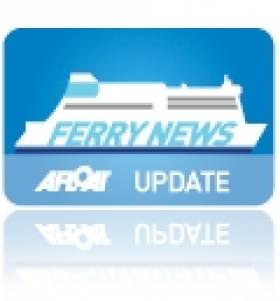Displaying items by tag: DDay 70 Anniversary
French Ferry Operator Plays it Part on D-Day 70th Anniversary and Not Just 'APP' Service
#FrenchD-DayFerries- As the eyes of the world will be focused on Quistreham, as previously reported, the French ferryport in northern France will be where the largest 'international' ceremonial event to commemorate the 70th D-Day Anniversary takes place this afternoon, writes Jehan Ashmore.
The allied invasion on 6 June 1944, was the largest amphibious assault ever launched and today's commerorative event (click for live TV coverage 3pm) in Ouistreham is the outer port of nearby Caen.
Royal families, heads of states and governments and world leaders and notably members of G'7' among them German Chancellor Angela Merkel, though Russian President, Vladimir Putin will be attending in his own capacity.
Due to the major event, Brittany Ferries which operates between Ouistreham (on the edge of 'Sword' Beach) and Portsmouth have diverted a scheduled round-trip sailing to Cherbourg instead. The diverted sailing from the UK port by Mont St. Michel is expected to arrive in Cherbourg at 16.00, one hour after the start of the major international commemorative event.
The Normandy port on the Cotentin Peninsula is as previously reported on Afloat.ie, is where the Breton based operator runs a service to the Hampshire port as well as to Poole in neighbouring Dorset.
Portsmouth was one of the key strategic locations across the UK south coast, where thousands of Allied troops left for Normandy 70 years ago and landed on Sword Beach, the easternmost of the five Normandy code-named beaches where more than 150,000 men came ashore. Thousands of men and indeed women were lost in the battle to liberate occupied France.
Fittingly both ports will be marking D-Day events in remembrance and Brittany Ferries which started the Ouistreham ferry service in 1986, is also playing a part by holding on board lectures about the historic World War II event.
For many of its customers, the route to the port which is connected to Caen by the Canal de Caen de la Mer, carries an unmistakeable symbolism as the canal is also the location of the famous 'Pegasus' bridge at Benouville.
Special arrangements have also been made to book veterans aboard its ferries also to Cherbourg and Le Havre as they travel to Normandy during this first week of June to pay homage to lost comrades.To accompany these VIPs, additinal staff at its ports and on board are to welcome and look after them.
Some veterans have chosen to hold special on-deck remembrance ceremonies as they approach the Normandy coast, where Brittany Ferries' captains will reduce speed of vessels to enable wreath-laying ceremonies at sea.
The ferry operator has launched a D-Day APP for more details click HERE and much more.
As for the present day, 900,000 passengers annually take the Portsmouth-Caen route and where 'Sword' beach played such an integral and strategic role compared to the peacetime leisure activities in which we all enjoy freedom and liberty.
This is in absolute stark reality to the critical and momentous World War II event, in which those who fought saw the very same beach for the first and also their last during enemy action. Today we all have the luxury to see the France coast and not merely as a fleeting glimpse!
#D-Day70Anniversary- As reported yesterday, the Royal Navy joined by allied naval vessels formed an overnight flotilla from Portsmouth and are currently off the Normandy Beaches on this D-Day 70th anniversary, writes Jehan Ashmore.
Throughout today, major religious and commemorative services are been attended by the dwindling number of allied World War II veterans. This morning members of the British Royal Family headed by Queen Elizabeth attended a service inland at Bayeux Cathedral.
Also today the largest D-Day ceremonial commemorative event takes place in Quistreham near Caen, as allied nations will be joined by around 19 states marking the proceedings the most 'international' when held on 'Sword' beach. This beach is one of five code named beaches that are within a 50 mile stretch of the Normandy coast.
Joining the World War II veterans at Quistreham will be royalty, political leaders, heads of states and dignitaries in a mark of respect and recognition to all those who fought and lost their lives in this critical and momentous campaign on 6 June 1944.
The Royal Navy's 'flagship' HMS Bulwark (L15) which as previously reported took part in the overnight allied flotilla is anchored offshore of Arromanches, where on 'Gold' beach naval landing craft are beached presenting a mere semblance to the battle scene to liberate France. Thousands of visitors are thronging the beaches and mass-scale cemetaries.
The other two beaches to the west of Arromanches is where the US fought on 'Utah' and 'Omaha' and to the east Canada took part on 'Juno' beach. The final beach is 'Sword' at Quistreham which formed the second beach in which Britain took action as part of the allied forces. This is to be last occasion of the Normandy Veterans Association in attending D-Day commemorations due to the dwindling numbers and as such the association is to be disbanded.
Among the flotilla from Portsmouth is HMS Express (P163) a small patrol boat which visited Dun Laoghaire Harbour in April and also that month when HNLMS Johann de Witt (L801) a landing platform dockship of the Royal Netherlands Navy called to Dublin Port.
In addition to the English Channel crossing flotilla and other navies are several cruiseships making commemorative cruises and berthed in Caen are Silver Cloud and Sea Cloud II. The city quays is also where the Royal Norwegian yacht K/S Norge is paying a visit, the vessel in recent years has made two tours to Irish ports.

























































